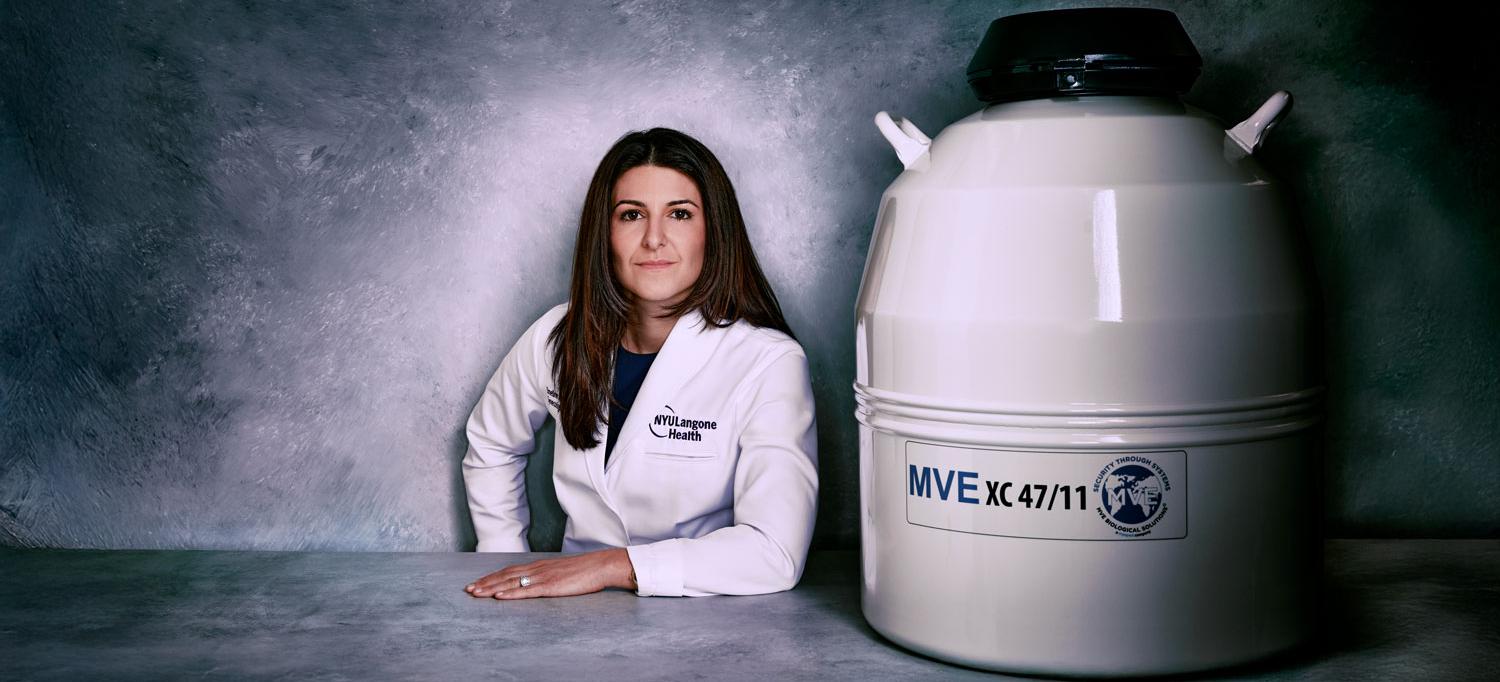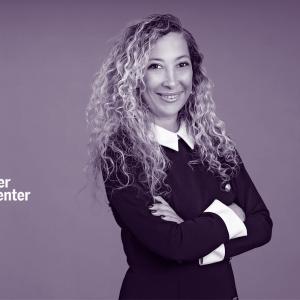
Gynecologic oncologist Emeline Aviki, MD, MBA, with one of the 40 tanks of liquid nitrogen at NYU Langone Reproductive Specialists of New York—Mineola. Each tank contains embryos, eggs, or sperm from Perlmutter Cancer Center patients undergoing cancer treatment.
Credit: Brad Trent
When Jenna Gobrick was diagnosed with stage 3 breast cancer in August 2024, she could hardly believe it. She was just 29, a decade younger than the age at which a woman’s risk of developing the disease typically begins to rise. “It’s one of those things you think won’t happen to you,” she recalls. “I was terrified.”
Surgical oncologist Melissa D. Fana, MD, at Perlmutter Cancer Center at NYU Langone Long Island Breast Surgery Associates—Patchogue, told Gobrick that cancer cells had spread to nearby lymph nodes. She would need chemotherapy to shrink the primary tumor before it could be removed. “I want you to start chemo yesterday,” Dr. Fana said. However, before referring Gobrick to a medical oncologist, the surgeon asked an unexpected question: “Do you plan on having children?”
“I don’t have a partner right now,” Gobrick confided, “but I want a family of my own someday.”
Dr. Fana explained that infertility is a common side effect of cancer therapies, including chemotherapy. But having a baby could still be possible, she assured Gobrick, with help from a groundbreaking program at NYU Langone Health.
Only a tiny minority of patients take advantage of technologies that can preserve their fertility before or during cancer treatment. Barriers include lack of awareness, the high cost of many fertility procedures, time constraints due to the urgent need to start treatment, and discomfort with discussing reproductive issues.
The Oncofertility Program at Perlmutter Cancer Center, a National Cancer Institute–designated Comprehensive Cancer Center, is designed to overcome those obstacles. Launched in February 2024, it offers fertility counseling, education, and access to a range of treatment options, including advanced surgical techniques available at few other institutions. Aside from clinical expertise, what sets the program apart is its unique approach. Each patient at Perlmutter Cancer Center is given the opportunity to receive oncofertility services through dedicated nurse navigators.
“We want to optimize patients’ ability to live normal lives after their cancer treatments, including having children if they wish,” says gynecologic oncologist Emeline M. Aviki, MD, MBA, the program’s physician lead. “Our goal is to ensure that every patient has seamless access to both standard-of-care and cutting-edge methods for fertility preservation.”
Dr. Aviki joined NYU Grossman Long Island School of Medicine as clinical assistant professor of obstetrics and gynecology in 2023 from Memorial Sloan Kettering Cancer Center. Although the NYU Langone Fertility Center has long offered egg freezing under the direction of reproductive endocrinologist and infertility specialists Elizabeth Fino, MD, in Manhattan and Linda Sung, MD, in Long Island, Dr. Aviki set out to increase access and participation while expanding specialized services to patients across the health system. She recruited Rosemary Semler, MA, RN, a veteran oncology nurse who had led Sloan Kettering’s program, to direct the initiative. Medical oncologist Abraham Chachoua, MD, director of Perlmutter Cancer Center’s Lung Cancer Center, championed the program and secured initial funding.
Under the new protocol, all patients diagnosed with cancer at NYU Langone are asked if they would like to receive fertility preservation counseling. If so, they’re referred to Semler or Vanguie Armijo Mora, RN, the program’s two nurse navigators.
A consult can be arranged within 24 hours. Navigators discuss the potential impacts of prescribed cancer treatments and options for fertility preservation. If a patient wants to proceed, they are provided referrals to related services, ranging from established approaches such as egg retrieval and sperm banking to such novel procedures as uterine transposition and ovarian tissue cryopreservation.
The program fosters collaboration across the cancer-care and fertility-preservation teams and provides resources for managing fertility-related costs. For instance, it partners with facilities that offer discounted rates for storing eggs and sperm and with philanthropic organizations that can assist with expenses, as well as coordinating financial aid from NYU Langone. So far, almost 250 patients have participated.
During Gobrick’s counseling session, on August 22, 2024, Armijo Mora confirmed that she was a good candidate for egg freezing, walked her through the process, and advised her on navigating insurance and potential funding sources. Gobrick then met with reproductive endocrinologist Vasilios T. Goudas, MD, at NYU Langone Reproductive Specialists of New York—Mineola. She began receiving daily hormone injections to stimulate egg production. On September 9, Dr. Goudas and his team retrieved 27 viable oocytes (“A very good number,” he says), froze them, and stored them in liquid nitrogen tanks at a secure facility.
Soon afterward, Gobrick started a course of chemotherapy and immunotherapy prescribed by medical oncologist Francis Arena, MD, at Perlmutter Cancer Center at NYU Langone Arena Oncology and Integration. In early 2025, Gobrick will undergo surgery, and once she’s ready to start a family, she’ll be well equipped to fulfill her dream.
“Everyone in the Oncofertility Program has been so comforting and supportive, and they’ve explained things clearly every step of the way,” Gobrick says. “It’s a huge relief to know that whenever I need my eggs they’ll be there waiting for me.”

